|
|
|
Sort Order |
|
|
|
Items / Page
|
|
|
|
|
|
|
| Srl | Item |
| 1 |
ID:
173846
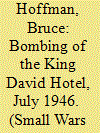

|
|
|
|
|
| Summary/Abstract |
On 22 July 1946, the Irgun Zvai Le’umi (National Military Organization), a Jewish terrorist organization opposed to Britain’s continued rule of Palestine, bombed Jerusalem’s King David Hotel. The incident has always been controversial given the fact that the facility was not an ordinary hotel, but also the nerve center of British rule over that country — housing its military headquarters, intelligence stations, and government secretariat. Further, at the time it was claimed that warnings were issued to evacuate the hotel that British officials callously ignored. This article addresses three key three questions surrounding the bombing: Was the King David Hotel in fact a legitimate military target? Were warnings in fact given to evacuate the hotel? And, if so, why wasn’t the hotel evacuated? The answers, while critical in reaching an accurate accounting and factual understanding of a highly controversial event, interestingly also shed light on the efficacy and morality of terrorism as an instrument of national liberation and agent of political change.
|
|
|
|
|
|
|
|
|
|
|
|
|
|
|
|
| 2 |
ID:
173847
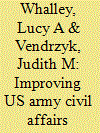

|
|
|
|
|
| Summary/Abstract |
Soldiers with operational experience in Afghanistan or Iraq have offered numerous critiques of the US Army Civil Affairs doctrine on assessment of the human domain, making recommendations for its improvement. The current process uses two frameworks, commonly known by the acronyms ASCOPE and PMESII-PT, to evaluate the operational environment. Neither the current process nor the proposed improvements address social power relations. It is unlikely that civil-military operations intended to establish peace and maintain stability will be successful if they are planned and executed without an in-depth understanding of social power. We advocate incorporating social power analysis into Civil Affairs assessment.
|
|
|
|
|
|
|
|
|
|
|
|
|
|
|
|
| 3 |
ID:
173845
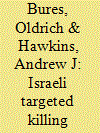

|
|
|
|
|
| Summary/Abstract |
This article offers a contextualized comparison of Israeli targeted killing operations aimed at Palestinian high value targets before and during the Second Intifada. Utilizing four indicators that can be directly attributed to a particular operation (elimination of the intended target, civilian and non-target casualties, directly-linked retaliatory attacks, and adverse political consequences), we analyzed thirty-eight Israeli targeted killing operations to determine whether the policy changes introduced during the Second Intifada (regarding the scale, legal basis, and targeting methods) resulted in increased operational success. Our findings indicate that according to all but the first indicator, Israeli targeted killing operations conducted during the Second Intifada were less successful than those conducted prior to this conflict.
|
|
|
|
|
|
|
|
|
|
|
|
|
|
|
|
| 4 |
ID:
173843
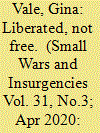

|
|
|
|
|
| Summary/Abstract |
In 2014, the Islamic State (IS) group launched a genocidal campaign against the Yazidis in Northern Iraq. IS used varied means to attack and fragment the Yazidi community: massacre of men; indoctrination and training of young boys; forced conversion of families; and kidnapping, enslavement, and rape of women and girls. Academic and policy attention has predominantly focused on IS’ sexual violence and rape of young Yazidi women and girls. This has led to the accounts of other female captives – namely, older women and undivided families – being overlooked or undervalued, excluding important elements of IS’s broader strategy of persecution. This paper analyses women’s varied experiences of captivity to reveal a fragmented population of female captives and seeks to demonstrates that IS exploited Yazidism’s religious and sociocultural customs to ensure that the impacts of its genocide – for the women themselves and the wider Yazidi community – continue beyond liberation. It concludes that although progress has been made to cope with trauma, displacement, and abuse, the community remains both physically and culturally fragmented.
|
|
|
|
|
|
|
|
|
|
|
|
|
|
|
|
| 5 |
ID:
173848


|
|
|
|
|
| Summary/Abstract |
From March 1972 until internment itself was eventually abandoned in December 1975 successive Secretaries of State for Northern Ireland used their powers to arrest and release republican internees. This article demonstrates that several factors contributed to the policy of controlling the arrests and releases of internees, and that the most important was not negotiations with the Provisional IRA (PIRA) but the need to encourage the engagement of moderate nationalists in an emerging political process. The story of internment is often exclusively seen in the narrower narratives of paramilitary historiography and the later ‘prison war’. This article adopts a broader contextual approach in which both moderate nationalist, and to a lesser extent, unionist concerns over arrests and releases are considered. In doing so, this work resituates the gradual ending of internment at the heart of the mainstream political discussions in Northern Ireland in the 1970s. The article also contends that this controlled use of internment as a political strategy ultimately proved to be successful for the British government in achieving their desired objectives.
|
|
|
|
|
|
|
|
|
|
|
|
|
|
|
|
| 6 |
ID:
173841


|
|
|
|
|
| Summary/Abstract |
In rebel-held Syria, an array of rebel organisations are nominally allied in their fight against the Syrian government and yet they remain internally divided. Rather than being a rare occurrence, fragmentation within rebel movements is a common phenomenon with wide-ranging consequences for its chances of success. The objective of this paper is to explain what has caused fragmented to occur in Syria from 2011 to 2017. Using a three-dimensional conceptualisation of rebel fragmentation, we identify based on Bakke et al’s, we identify and analyse the causes of rebel fragmentation within the Syrian rebel movement and illustrate how these dynamics have influenced the overall degree of fragmentation throughout four phases of the conflict. The study finds that the splintering of the Syrian rebel movement is a second-order effect of historical, structural and geopolitical factors generally outside the immediate control of the non-state actors.
|
|
|
|
|
|
|
|
|
|
|
|
|
|
|
|
| 7 |
ID:
173849


|
|
|
|
|
| Summary/Abstract |
Over the past ten years, problems with using internet and social media as reliable research tools have emerged alongside rapid technological changes in scholarly research, writing and publishing. This poses a particular problem within the study of armed conflict and violent non-state actors, where much cannot be definitively known and there are few guidelines available. The result is an overwhelming submission of documents citing unacceptable sources. New approaches to research in armed conflict and violent non-state actors are needed, and one forthcoming book on Boko Haram attempts to address this. Researchers are provided with guidelines for assessing online sources, and the imperative to do so is strongly advised.
|
|
|
|
|
|
|
|
|
|
|
|
|
|
|
|
| 8 |
ID:
173844
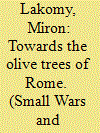

|
|
|
|
|
| Summary/Abstract |
This paper aims to contribute to understanding how the last flagship magazine of the Islamic State - “Rumiyah” - attempted to influence and manipulate Internet users. Its primary objective is to analyze the propaganda methods exploited in all thirteen issues of this magazine. In order to do so this paper utilises content analysis to investigate “propaganda devices”, a concept developed by the American Institute for Propaganda Analysis. It argues that there were four predominant groups of propaganda devices exploited in this magazine. Two of them, i.e. name-calling and glittering generalities, were utilized to create and promote an artificial, black-and-white vision of the world, composed of the “camp of kufr” (camp of disbelief) and the “camp of iman” (camp of faith), embodied by the Islamic State. The third leading propaganda method, transfer, attempted to legitimize the actions and agenda of the “Caliphate” by using the authority of not only Allah, but also the Prophet Muhammad, his companions (Sahabah), as well as selectively chosen Islamic scholars. Finally, the bandwagon served as a means of creating a sense of community between the editors and readers. Other propaganda devices, such as testimonial or plain folks, played strictly secondary roles in the narration of the magazine.
|
|
|
|
|
|
|
|
|
|
|
|
|
|
|
|
| 9 |
ID:
173842
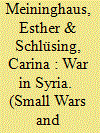

|
|
|
|
|
| Summary/Abstract |
Current research on civil war neglects the effect of translocal ties on the mobilization of fighters in armed groups (AGs). Yet the Syrian war demonstrates the necessity to pay close attention to this twofold process: Analysing YPG, Hizballah and FSA networks, we argue that AGs are more likely to persist and avoid fragmentation in the long-term if they maintain strong linkages with local communities (local anchoring) and functioning linkages across different localities. We introduce here the concept of translocality to war studies, differentiating it from transnationalism. This analytical lens enables us to focus on localities within Syria, which can influence an actor’s power position in war decisively, while also being subjected to drastic change by AGs. We conclude that translocality offers insights for the study of civil war as it enables us to grasp the embedding of armed groups – or lack thereof – in local communities; differentiating between actor groups depending on their local anchoring, and observing network dynamics between different localities.
|
|
|
|
|
|
|
|
|
|
|
|
|
|
|
|
|
|
|
|
|